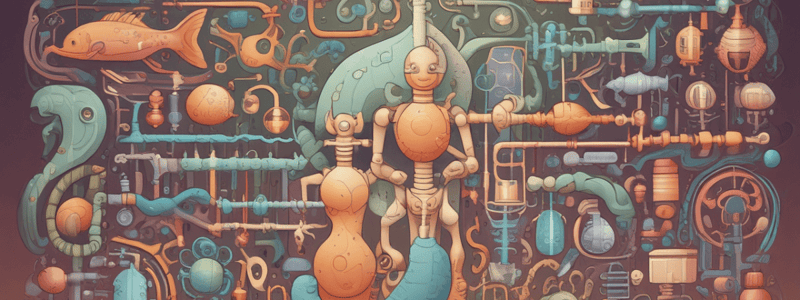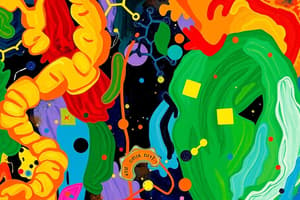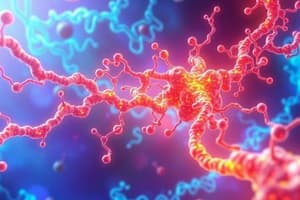Podcast
Questions and Answers
The amino acid pool is primarily depleted through the synthesis of body protein.
The amino acid pool is primarily depleted through the synthesis of body protein.
True (A)
The amino acid pool is larger than the total amount of protein in the body.
The amino acid pool is larger than the total amount of protein in the body.
False (B)
Protein turnover involves the continuous synthesis and degradation of proteins.
Protein turnover involves the continuous synthesis and degradation of proteins.
True (A)
For most proteins, degradation plays a more significant role in controlling their concentration than synthesis.
For most proteins, degradation plays a more significant role in controlling their concentration than synthesis.
Plasma proteins are primarily synthesized in the kidneys.
Plasma proteins are primarily synthesized in the kidneys.
Albumin constitutes approximately 60% of all plasma proteins.
Albumin constitutes approximately 60% of all plasma proteins.
Alpha globulins include proteins like transferrin.
Alpha globulins include proteins like transferrin.
Beta globulins are a simpler class of proteins compared to albumin.
Beta globulins are a simpler class of proteins compared to albumin.
The primary protein involved in blood osmotic pressure maintenance is fibrinogen.
The primary protein involved in blood osmotic pressure maintenance is fibrinogen.
Globulins and albumin play a role in the transportation of hormones and other molecules within the body.
Globulins and albumin play a role in the transportation of hormones and other molecules within the body.
Liposomal proteases are responsible for breaking down proteins into amino acids within the cell.
Liposomal proteases are responsible for breaking down proteins into amino acids within the cell.
During starvation, muscle protein can be broken down into amino acids, which can then be used for gluconeogenesis to generate energy.
During starvation, muscle protein can be broken down into amino acids, which can then be used for gluconeogenesis to generate energy.
The human body has a mechanism for storing excess amino acids.
The human body has a mechanism for storing excess amino acids.
Glutamine can act as a fuel source for the renal system during metabolic acidosis.
Glutamine can act as a fuel source for the renal system during metabolic acidosis.
The decomposition of excess amino acids produces hydrocarbons and nitrogenous waste, including ammonium ions.
The decomposition of excess amino acids produces hydrocarbons and nitrogenous waste, including ammonium ions.
The urea cycle is responsible for processing and excreting nitrogen from the body, preventing toxic buildup of ammonium ions.
The urea cycle is responsible for processing and excreting nitrogen from the body, preventing toxic buildup of ammonium ions.
Vitamin B1, also known as thiamin, is a component of a coenzyme in carbohydrate metabolism.
Vitamin B1, also known as thiamin, is a component of a coenzyme in carbohydrate metabolism.
A deficiency in vitamin B2 can lead to inflammation of the skin, tongue, and lips.
A deficiency in vitamin B2 can lead to inflammation of the skin, tongue, and lips.
Niacin, or nicotinic acid, is a component of coenzymes used in the oxidation of fuel molecules.
Niacin, or nicotinic acid, is a component of coenzymes used in the oxidation of fuel molecules.
Vitamin B6 is not involved in the synthesis of hemoglobin.
Vitamin B6 is not involved in the synthesis of hemoglobin.
A deficiency in folic acid can result in neural tube defects in the fetus.
A deficiency in folic acid can result in neural tube defects in the fetus.
Vitamin B12 is essential for normal blood formation and neurological function.
Vitamin B12 is essential for normal blood formation and neurological function.
Pantothenic acid plays a role in the metabolism of carbohydrate, protein, and fat.
Pantothenic acid plays a role in the metabolism of carbohydrate, protein, and fat.
Biotin is a cofactor in the metabolism of only carbohydrate and fatty acids.
Biotin is a cofactor in the metabolism of only carbohydrate and fatty acids.
Vitamin C, or ascorbic acid, is an antioxidant that enhances the absorption of heme iron from plant foods.
Vitamin C, or ascorbic acid, is an antioxidant that enhances the absorption of heme iron from plant foods.
Vitamin A plays a crucial role in maintaining normal vision and the integrity of epithelial cells.
Vitamin A plays a crucial role in maintaining normal vision and the integrity of epithelial cells.
Vitamin E supplements are primarily used to aid in blood clotting.
Vitamin E supplements are primarily used to aid in blood clotting.
Vitamin K is more popular in the supplement market compared to vitamins C, D, and E.
Vitamin K is more popular in the supplement market compared to vitamins C, D, and E.
High doses of Vitamin E can pose risks to health.
High doses of Vitamin E can pose risks to health.
Vitamin K is found exclusively in animal products.
Vitamin K is found exclusively in animal products.
The Vitamin E supplement market reached approximately $820 million last year.
The Vitamin E supplement market reached approximately $820 million last year.
Many fat burners and nootropics do not contain B vitamins.
Many fat burners and nootropics do not contain B vitamins.
Vitamin K is one of the essential vitamins and plays a role in various bodily functions.
Vitamin K is one of the essential vitamins and plays a role in various bodily functions.
Supplementation with Vitamin E is the only way to address a Vitamin E deficiency.
Supplementation with Vitamin E is the only way to address a Vitamin E deficiency.
Vitamin B6 helps your body create antibodies and break down proteins.
Vitamin B6 helps your body create antibodies and break down proteins.
Vitamin B7 is crucial to metabolizing protein and maintaining a well-functioning central nervous system.
Vitamin B7 is crucial to metabolizing protein and maintaining a well-functioning central nervous system.
Folic Acid helps you create and maintain healthy cells.
Folic Acid helps you create and maintain healthy cells.
Vitamin C is a fat-soluble vitamin.
Vitamin C is a fat-soluble vitamin.
Vitamin D can help your body absorb calcium.
Vitamin D can help your body absorb calcium.
Vitamin D supplements have decreased in popularity in recent years.
Vitamin D supplements have decreased in popularity in recent years.
Vitamin E is crucial for the health of your liver and eyes.
Vitamin E is crucial for the health of your liver and eyes.
Cholecalciferol is the vegetarian form of Vitamin D.
Cholecalciferol is the vegetarian form of Vitamin D.
Flashcards
Amino Acid Pool
Amino Acid Pool
The total amount of amino acids available in the body.
Protein Turnover
Protein Turnover
The continuous process of breaking down and building up proteins.
Plasma Proteins
Plasma Proteins
Proteins found in the blood plasma, synthesized primarily by the liver.
Albumin
Albumin
Signup and view all the flashcards
Globulins
Globulins
Signup and view all the flashcards
Fibrinogen
Fibrinogen
Signup and view all the flashcards
Protein Catabolism
Protein Catabolism
Signup and view all the flashcards
Proteases
Proteases
Signup and view all the flashcards
Muscle-Derived Amino Acids
Muscle-Derived Amino Acids
Signup and view all the flashcards
Glutamine
Glutamine
Signup and view all the flashcards
Amino Acid Conversion
Amino Acid Conversion
Signup and view all the flashcards
Waste Products of Amino Acid Metabolism
Waste Products of Amino Acid Metabolism
Signup and view all the flashcards
Urea Cycle
Urea Cycle
Signup and view all the flashcards
Vitamins
Vitamins
Signup and view all the flashcards
Water-Soluble Vitamins
Water-Soluble Vitamins
Signup and view all the flashcards
Thiamin (Vitamin B1)
Thiamin (Vitamin B1)
Signup and view all the flashcards
Riboflavin (Vitamin B2)
Riboflavin (Vitamin B2)
Signup and view all the flashcards
Niacin
Niacin
Signup and view all the flashcards
Vitamin B6
Vitamin B6
Signup and view all the flashcards
Folic Acid (Vitamin B9)
Folic Acid (Vitamin B9)
Signup and view all the flashcards
Vitamin B12
Vitamin B12
Signup and view all the flashcards
Pantothenic Acid
Pantothenic Acid
Signup and view all the flashcards
Biotin
Biotin
Signup and view all the flashcards
Vitamin C
Vitamin C
Signup and view all the flashcards
Fat-Soluble Vitamins
Fat-Soluble Vitamins
Signup and view all the flashcards
Vitamin A
Vitamin A
Signup and view all the flashcards
Vitamin D
Vitamin D
Signup and view all the flashcards
Vitamin E
Vitamin E
Signup and view all the flashcards
Vitamin K
Vitamin K
Signup and view all the flashcards
Importance of Vitamins in Health
Importance of Vitamins in Health
Signup and view all the flashcards
Study Notes
Amino Acid Pool and Protein Turnover
- Amino pool depleted via synthesis of body proteins, amino acids used for nitrogen-containing compounds, and conversion to glucose or fatty acids.
- The amino acid pool is approximately 90-100 grams, contrasting with around 12 kg of total body protein in a 70-kg individual.
- Protein turnover involves continual synthesis and degradation of proteins to remove unwanted ones.
- For some proteins, synthesis regulation is crucial, while others depend on selective degradation for maintaining levels.
Plasma Proteins
- Plasma proteins, synthesized mainly by the liver, perform various biological roles.
- Key plasma proteins: albumin (60% of plasma proteins), globulins (including alpha, beta, and gamma globulins), and fibrinogen.
Functions of Plasma Proteins
- Albumin: Maintains blood osmotic pressure and electrolyte balance.
- Globulins: Transport hormones and nutrients; includes immunoglobulins for immune response.
- Fibrinogen: Essential for blood clotting, converting into fibrin during the clotting process.
Hormonal Regulation of Protein Metabolism
- Proteins undergo catabolism to replenish the intracellular amino acid pool, facilitated by proteases.
- Muscle proteins can degrade to amino acids for energy in starvation; glutamine provides fuel during metabolic acidosis.
- Excess amino acids are converted to glucose or ketones; decomposition produces waste products.
- Urea cycle processes and excretes nitrogen to prevent toxicity from high ammonium ion levels.
Vitamins
- Essential vitamins (13 total) are derived from diet; divided into water-soluble and fat-soluble groups.
- Cannot be sufficiently synthesized by the body, necessitating dietary intake.
Water-Soluble Vitamins
- Vitamin B1 (Thiamin): Nerve function, carbohydrate metabolism; deficiency leads to nervous and cardiac issues.
- Vitamin B2 (Riboflavin): Energy production and skin health; deficiency causes skin and ocular symptoms.
- Niacin: Supports metabolism and skin health; deficiency results in skin lesions and gastrointestinal issues.
- Vitamin B6: Aids in amino acid metabolism and hemoglobin synthesis; deficiency linked to dermatitis and mental health issues.
- Folic Acid (B9): Essential for DNA synthesis and red blood cell maturation; deficiency can cause anemia and neural tube defects.
- Vitamin B12: Required for amino acid and cell metabolism; deficiency leads to tongue smoothness and gastrointestinal disturbances.
- Pantothenic Acid: Involved in macronutrient metabolism; deficiency causes fatigue and gastrointestinal issues.
- Biotin: Important for metabolism of macronutrients; deficiency may cause dermatitis and hair loss.
- Vitamin C: Antioxidant and collagen synthesis; deficiency leads to scurvy and immune issues.
Fat-Soluble Vitamins
- Vitamin A: Vital for vision, skin health, and immunity; deficiency causes vision problems and skin issues.
- Vitamin D: Regulates calcium and bone health; deficiency leads to soft bones and growth issues.
- Vitamin E: Antioxidant protecting cells; deficiency can cause nerve issues and red blood cell breakdown.
- Vitamin K: Essential for blood coagulation and bone health; deficiency may result in bleeding disorders.
Importance of Vitamins in Health
- Vitamins play critical roles in maintaining overall health, with varied functions that impact metabolism, immune response, and cellular processes.
- Supplementation trends show increasing importance, especially for vitamins like B6, B12, C, D, E, and K.
Studying That Suits You
Use AI to generate personalized quizzes and flashcards to suit your learning preferences.




